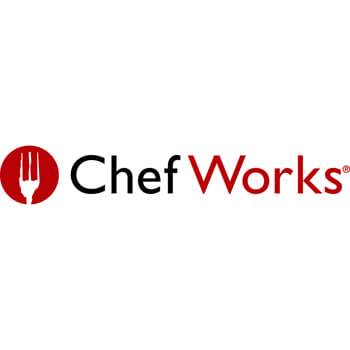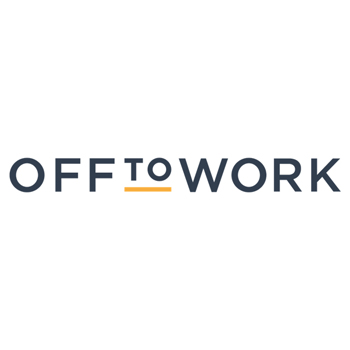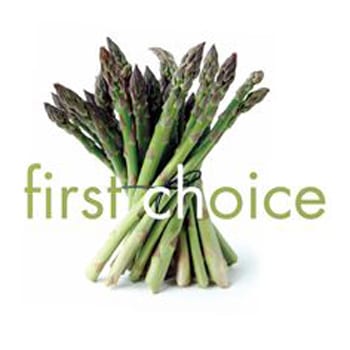Halibut But Not as We Know It
Have you come across the white salmon? We hadn’t until we started working with Royal Greenland where the Greenland halibut comes from. It’s a flat, oily, white fish with very few bones that is very versatile. With our curiosity suitably piqued we set out to find out more.
 Greenland halibut is found in the North Atlantic and the Arctic Ocean, from Canada in the west to Norway in the east. It’s is a flatfish that is dark on the upper side and lighter on the belly. It has a set of sharp teeth for hunting its prey such as prawns, krill, capelin and redfish. The Greenland halibut is also known to prey on Atlantic cod, grenadier or squid. It lives near the bottom and prefers depths of 200-2,000 metres, where water temperatures remain below 4°C.
Greenland halibut is found in the North Atlantic and the Arctic Ocean, from Canada in the west to Norway in the east. It’s is a flatfish that is dark on the upper side and lighter on the belly. It has a set of sharp teeth for hunting its prey such as prawns, krill, capelin and redfish. The Greenland halibut is also known to prey on Atlantic cod, grenadier or squid. It lives near the bottom and prefers depths of 200-2,000 metres, where water temperatures remain below 4°C.
As a fish it is highly appreciated for its snowy-white meat which has a delicate and soft texture. It is easy to cook with, recognised for its delicate flavour and extremely rich in omega-3 fatty acids.
Greenland halibut appears to have all the attributes of red salmon but the added advantage of having white flesh.
 “The chef at the Food Sorcery Kitchen in Didsbury put the Greenland halibut to the test and came up with a dozen of possibilities,” Royal Greenland’s Solenne Labarere, told The Chefs’ Forum.
“The chef at the Food Sorcery Kitchen in Didsbury put the Greenland halibut to the test and came up with a dozen of possibilities,” Royal Greenland’s Solenne Labarere, told The Chefs’ Forum.
“He came up with ceviche, carpaccio, BBQ, pan-fried, deep-fried, curried and many more. It can take pungent flavours but also work well with more traditional flavours (brown butter, capers etc).
“We are selling the fillet skinless as it is really hard to make the skin crispy, like you would with cod for instance. The Greenland halibut has been a delicacy in Greenland for centuries, but has with good reason also won popularity around the world. It is easy to work with, almost impossible to overcook and works in numerous dishes. This makes the Greenland halibut an easily incorporated ingredient in cooking.
 “The texture of the flesh is soft and tender, with a bright white appearance both cooked and raw. In terms of flavour, the Greenland halibut offers a sweet and mild umami experience, which is complimented well by a slightly sour or bitter opponent, or by a touch of salt to enhance the umami and lessen the sweetness.
“The texture of the flesh is soft and tender, with a bright white appearance both cooked and raw. In terms of flavour, the Greenland halibut offers a sweet and mild umami experience, which is complimented well by a slightly sour or bitter opponent, or by a touch of salt to enhance the umami and lessen the sweetness.
“In terms of nutrition, the Greenland halibut offers a high content of healthy fat and omega-3 fatty acids, while also being a good source of vitamin D, phosphorus and selenium.
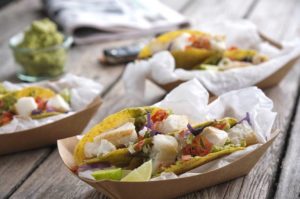 “The processing of Greenland halibut begins at our Greenlandic factories and on board our vessels. The land-based factories are located as close to the harbour as possible, to provide the shortest route from sea to processing.
“The processing of Greenland halibut begins at our Greenlandic factories and on board our vessels. The land-based factories are located as close to the harbour as possible, to provide the shortest route from sea to processing.
“At our land-based factories, the Greenland halibut is cut into different products, such as J-cut, fillets with and without skin, frills or head-on gutted. At sea, the two trawlers Sisimiut and Tuugalik are equipped to process the Greenland halibut as a J-cut before being frozen, or simply frozen as whole round fish”.
Anatomy of a Dessert – The Chefs’ Forum Interviews Franciane Tartari
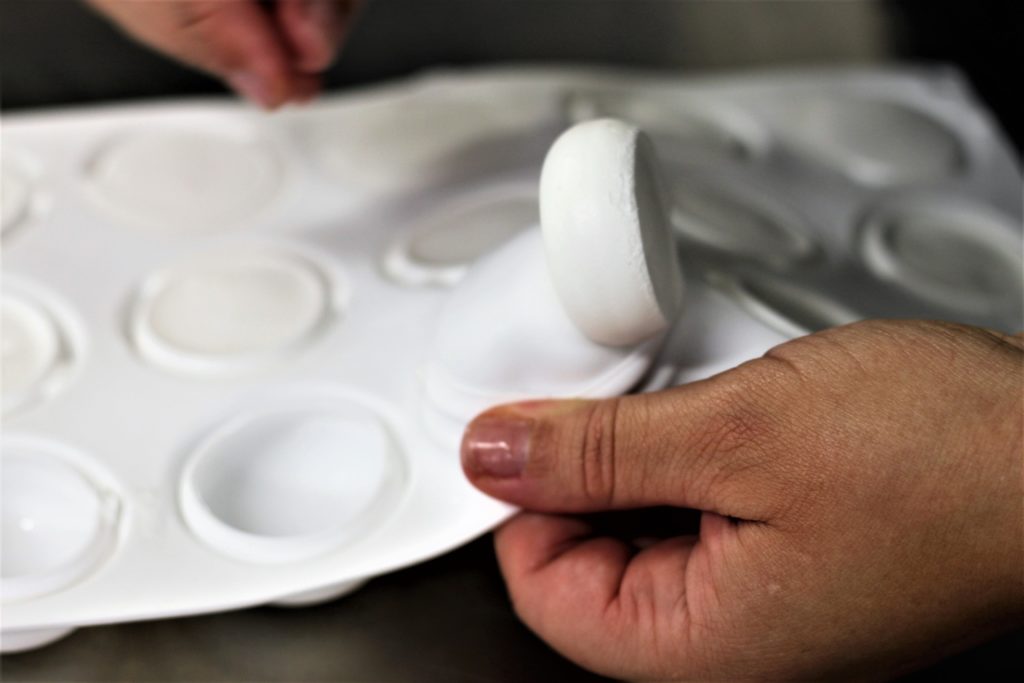
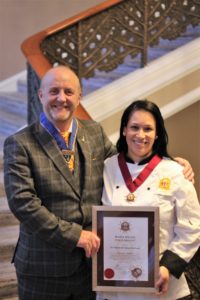 Brazilian pastry chef Franciane Tartari created a special dessert for The Chefs’ Forum 10th Anniversary lunch in Edinburgh on Monday. She talked to editor Chandos Elletson about bringing the flavours of Brazil to an updated rum baba utilising the Silikomart Curveflex SF164 mould for the baba and Curveflex Truffles mould for the sorbet.
Brazilian pastry chef Franciane Tartari created a special dessert for The Chefs’ Forum 10th Anniversary lunch in Edinburgh on Monday. She talked to editor Chandos Elletson about bringing the flavours of Brazil to an updated rum baba utilising the Silikomart Curveflex SF164 mould for the baba and Curveflex Truffles mould for the sorbet.
Franciane has just been accepted into the World Masterchefs Society (spanning 54 countries) and this dessert was absolute endorsement of such a prestigious accolade.
Daniel Ayton, Senior Vice President of the World Masterchefs society is a real fan of Franciane’s work he said
“I’ve known Franciane for over a decade and judged internationally with her across Europe. To be awarded this accolade, chefs need to have demonstrated quality craftsmanship and culinary excellence. The medal that she was awarded The Culinary Order of Merit and to my mind this is wholly deserved and I am proud to have Franciane as a member of the World Masterchefs Society to help us in our mission to continually advance the culinary arts.”
 Franciane really enjoyed cooking with the students from Edinburgh College and West Lothian College at Edinburgh’s iconic Caledonian Hotel – She really enjoyed teaching new pastry skills to the students and was really impressed with the way they all rolled up their sleeves and worked brilliantly as a team, she said
Franciane really enjoyed cooking with the students from Edinburgh College and West Lothian College at Edinburgh’s iconic Caledonian Hotel – She really enjoyed teaching new pastry skills to the students and was really impressed with the way they all rolled up their sleeves and worked brilliantly as a team, she said
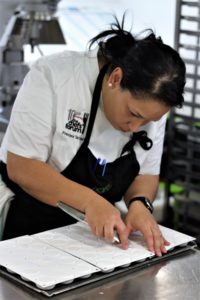 “I was thrilled when Catherine asked me to create a dessert for the lunch at The Waldorf Astoria – The Caledonian on Monday. I wanted to bring the flavours of Latin America with me and the best way to do that, I thought, was to make a rum baba except infuse it with the flavours of pina colada – Brazilian rum and pineapple.
“I was thrilled when Catherine asked me to create a dessert for the lunch at The Waldorf Astoria – The Caledonian on Monday. I wanted to bring the flavours of Latin America with me and the best way to do that, I thought, was to make a rum baba except infuse it with the flavours of pina colada – Brazilian rum and pineapple.
“One thing I knew, thought, was that I couldn’t make the baba dessert in the traditional way – it would have been to large and too rich. So, I worked with a special mold to make half spheres and these were arranged on the plate with spheres of coconut sorbet and a rum syrup made with pineapple purée.
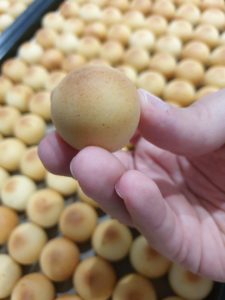 “Getting the balance between richness and size was my main focus. There were also contrasting flavours like a coconut Chantilly and a pineapple, chilli and vanilla compote. Finally, the whole dish was pulled together by a hot passion fruit tequila consommé.
“Getting the balance between richness and size was my main focus. There were also contrasting flavours like a coconut Chantilly and a pineapple, chilli and vanilla compote. Finally, the whole dish was pulled together by a hot passion fruit tequila consommé.
“The dessert was a fitting end to the meal and was very well-received. I had such great help from the students in the kitchen and from the hotel. It was a great occasion. Plus, the new moulds from Mitchell & Cooper were great!”
To find out more about the fantastic range of pastry moulds on offer by Mitchell & Cooper visit www.mitchellcooper.co.uk
Nail that Interview
Chefs are in demand and some restaurants and hospitality businesses are even offering signing on bonuses. Indeed, there has never been a better time to be a chef. However, just because there is a shortage does not mean you can just show up and expect to get what you want. The best jobs are going to go to the best candidates and that means now is the perfect time to work on your interview skills.
Craig Taylor of recruitment specialists TTW Recruitment tells The Chefs’ Knowledge the best way to prepare.
“There are two stages to an interview and the hardest work is done before you actually show up. My advice is that you research the employer in advance. What do I mean by that? For starters, look at their menus, reviews and even visit the business and try it out as a customer. I can tell you that they will love that degree of seriousness!
“Make sure you prepare the night before and get ready. Work out how you are going to get there. Keep a note of who you are meeting and what their position is. Get your clothes ready. All these little details take the pressure off and show how in control you are. Don’t forget that prospective employers are looking at far more than just your ability to cook.
“Make sure you have left enough time for an interview and that you don’t have to rush away. That never looks good. Read through your CV and any documents you are taking to make sure it’s all neat, tidy and correct. The last thing you want is to be handing something over that is messy and untrue.
Prepare some questions. If you don’t know what to ask then use these:
- How will I be supported in the job, from the start?
- Do you have lots of vacancies and why?
- What development opportunities are there?
- What hours or shifts do the brigade work?
- What’s the next stage?
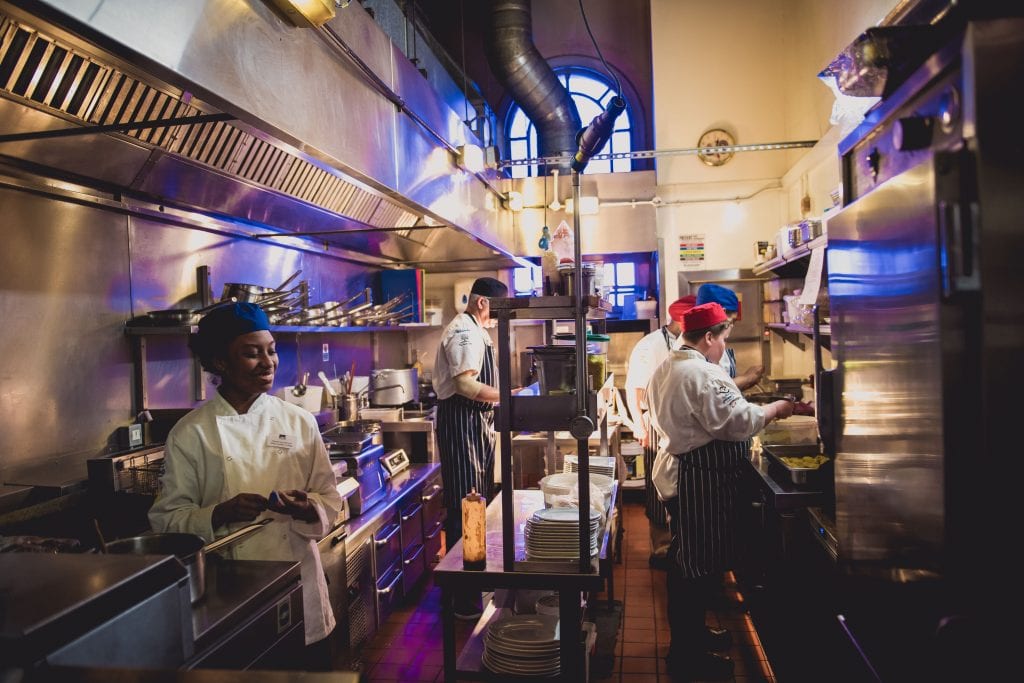 The second part of the process is the interview itself. Here are some thoughts to bear in mind.
The second part of the process is the interview itself. Here are some thoughts to bear in mind.
“Turn your phone off! This is so important. Next, don’t forget to smile and say ‘Hello, nice to meet you!” (You can’t go wrong!)
“If you shake hands then do so with confidence and make eye contact. These little details add up.
Try not to be nervous, treat it like a fact finding chat. You want to know about them and they want to know about you!
“A good interviewer will make you feel at ease, give you an insight to the job and company. They should ask you questions or allow you to tell them about you. Try and give open answers, avoid yes and no, expand on what you are saying and where possible, give examples!
“Be honest with your answers, its ok if you don’t know or ask them to put the question another way if you don’t understand.
“Ask your questions, its your chance to interview them and find out what you want to know.
Don’t be afraid to ask about money, hours etc – its all good stuff!
“At the end, thank them for the time, shake hands, smile and say “look forward to hearing from you!”
Finally, remember these don’ts!
- Don’t be late
- Don’t keep looking down
- Don’t mumble – speak clearly
- Don’t look at your phone – it should be off
- Don’t yawn
- Don’t lie
- Don’t be silent – engage in conversation
The Crustastun Reaches Its Brilliant Best
When a top chef gets hold of a top piece of kit that’s when the magic happens. To make his famous lobster bisque, Chef Simon Wood didn’t just need top quality lobster – he sourced that from Flying Fish in Cornwall – he needed to find the best way to prepare it before cooking. That meant he had to dispatch it ethically by using the Crustastun. But, and here’s the brilliant bit, the result was the most delicately-flavoured lobster he’d ever tasted.
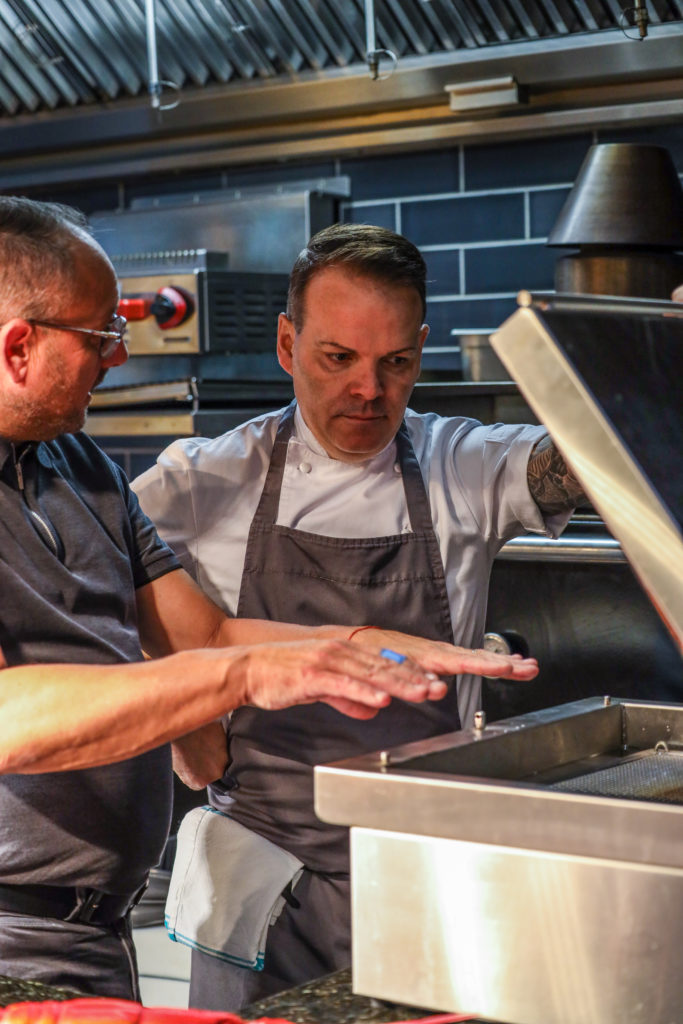 “It was ridiculously good,” he told The Chefs’ Knowledge. “I’d heard the stories but tasting it for real was something else. The lobster was perfect. Not only was it delicate but it was tender and as it should be.”
“It was ridiculously good,” he told The Chefs’ Knowledge. “I’d heard the stories but tasting it for real was something else. The lobster was perfect. Not only was it delicate but it was tender and as it should be.”
The bisque was being prepared for a live kitchen equipment review hosted by Mitchell and Cooper to put the Crustastun through its paces. The machine uses salt water and an electrical current to humanely stun and dispatch lobsters without pain and to keep the meat in perfect condition.
 The Crustastun was joined by its French Mitchell & Cooper stablemate, the Dynamic 160 stick blender. Both pieces of market-leading catering equipment are available from the family-run manufacturer and distributor based in Ukfield in East Sussex.
The Crustastun was joined by its French Mitchell & Cooper stablemate, the Dynamic 160 stick blender. Both pieces of market-leading catering equipment are available from the family-run manufacturer and distributor based in Ukfield in East Sussex.
“It’s ethical,” explained Kat Cooper. “With new laws being introduced to govern the sentience of shellfish, chefs have to find new ways to dispatch shellfish and the Crustastun does an excellent job with lobster and crab. And with chefs like Simon Wood using the technology the benefits are evident in the colour of the lobster, its taste and texture. We are proud to manufacture Crustastun in our factory and are really excited that Simon has joined the crusade to champion high-welfare kitchens and humane dispatch of crustaceans.”
“I made a bisque from the shells and the bodies of the lobsters and reserved the flesh for the garnish,” said Wood. “The result was an amazing soup that had incredible depth of flavour.”
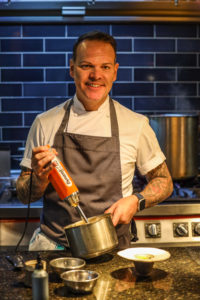 “I used the Dynamic 160 stick blender to foam the bisque when I plated it – I achieved the perfect cover to give the guests the surprise of deliciously tender tail meat, cooked in smoked butter, surrounded by sea herbs, pickled tomatoes and fennel as soon as they remove the perfectly-aerated foamy lid – This dish is one of my absolute favourites and the quality of the Cornish lobster from Flying Fish is absolutely sublime.
“I used the Dynamic 160 stick blender to foam the bisque when I plated it – I achieved the perfect cover to give the guests the surprise of deliciously tender tail meat, cooked in smoked butter, surrounded by sea herbs, pickled tomatoes and fennel as soon as they remove the perfectly-aerated foamy lid – This dish is one of my absolute favourites and the quality of the Cornish lobster from Flying Fish is absolutely sublime.
 I believe an animal should be treated with the utmost respect from the moment it is harvested. Sourcing from Flying Fish, then dispatching humanely with the Crustastun means I can confidently tell the provenance story to my guests – Gone are the days when chefs would throw live lobster into boiling water – We all have to do our bit to make positive change in our kitchens.”
I believe an animal should be treated with the utmost respect from the moment it is harvested. Sourcing from Flying Fish, then dispatching humanely with the Crustastun means I can confidently tell the provenance story to my guests – Gone are the days when chefs would throw live lobster into boiling water – We all have to do our bit to make positive change in our kitchens.”
“It really was a triumph,” said Catherine Farinha, Director of The Chefs’ Forum. “This is a piece of equipment that chefs can use with certainty. Not only will their shellfish dishes be ethical which is what customers want, but the product actually tastes better. Everyone wins.”
Australia Comes Calling for Hospitality Superstars to Move Down Under

Join the team at Australian Venue Co & earn $1,000 Welcome Credit
Register your interest: Click here
Australian Venue Co is the second largest hospitality group in Australia, with more than 180+ venues across the country. They own & operate leading pubs, bars, and restaurants in Sydney, Melbourne, Cairns, Perth, The Gold Coast, Brisbane & more!
Now is the time to move down under with the assistance of a top hospitality company, Australian Venue Co. who are on the hunt for hospitality superstars to join its team.
The hospitality company is passionate about training and development and will help turn your hospitality job into a career. They have a range of front & back of house roles available including Venue Manager, Chef, Cook, Bartender and many more! You can be an existing head chef or a student looking for a new start, Australian Venue Co. is interested in all in all levels of experience.
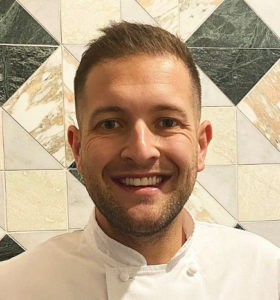 Executive chef Christian Abbott, who moved to Australia from the UK to join the group seven years ago, explained what they are looking for: “We are looking for recruits from the UK who would consider an opportunity to join us in Australia. We will help you with the process including visas and support with your flights on a case-by-case basis. You’ll be joining friendly and fun workplace culture.
Executive chef Christian Abbott, who moved to Australia from the UK to join the group seven years ago, explained what they are looking for: “We are looking for recruits from the UK who would consider an opportunity to join us in Australia. We will help you with the process including visas and support with your flights on a case-by-case basis. You’ll be joining friendly and fun workplace culture.
“What I have enjoyed about living and working in Australia is how different the pace of life is. I had to learn to adapt because everything is much slower and more relaxed. There’s much more of a work/life balance. We exercise together and have a walk before work, for example.
 “I understand what it’s like to move across the world, but with the Australian Venue Co Welcome Pack, we’re sure you’ll fit in easily.”
“I understand what it’s like to move across the world, but with the Australian Venue Co Welcome Pack, we’re sure you’ll fit in easily.”
Don’t just take Christian’s word, here are what some of the employees at Australian Venue Co have to say:
“The business opportunities and work-life balance here are great – Head Chefs and Venue Managers have the option to work a 4-day week, and the progression opportunities and business-learning aspects of these roles are industry-leading. If someone wanted to manage their own venue one day, they have the opportunity at AVC to pick up those skills on the job. If you’re at a stage where you think you’ve done it all, there’s so much more to learn here.”
Kirra Parsons – Senior Head Chef, Middle Park Hotel
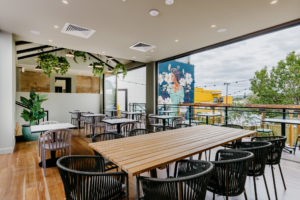 “AVC did a great job of looking after their staff during the lockdown. We made about 30,000 meals for Meals for Mates. That meant AVC staff members who weren’t working were able to put their skills to use with Job keeper,” he says. “AVC was also able to include sponsored workers in that program, which was a nice point of difference from other companies. The level of support we have here with head office and marketing is awesome.
“AVC did a great job of looking after their staff during the lockdown. We made about 30,000 meals for Meals for Mates. That meant AVC staff members who weren’t working were able to put their skills to use with Job keeper,” he says. “AVC was also able to include sponsored workers in that program, which was a nice point of difference from other companies. The level of support we have here with head office and marketing is awesome.
One of the core values at AVC is agility, which is reacting quickly to changes, whether it be a pandemic or otherwise. I’ve learned the importance of understanding a changing demographic, understanding where society is heading, and reacting to those changes,” he says. “I’ve definitely come to appreciate agility as a skill while I’ve been at AVC, and I don’t necessarily think I did in the past.
The best part is, with be opportunities to move into behind-the-scenes roles if you’re proactive and apply yourself. It’s great if you love hospitality and want to stay involved in the industry from a different angle.”
Dylan Hewlett – Venue Manager, The Smith
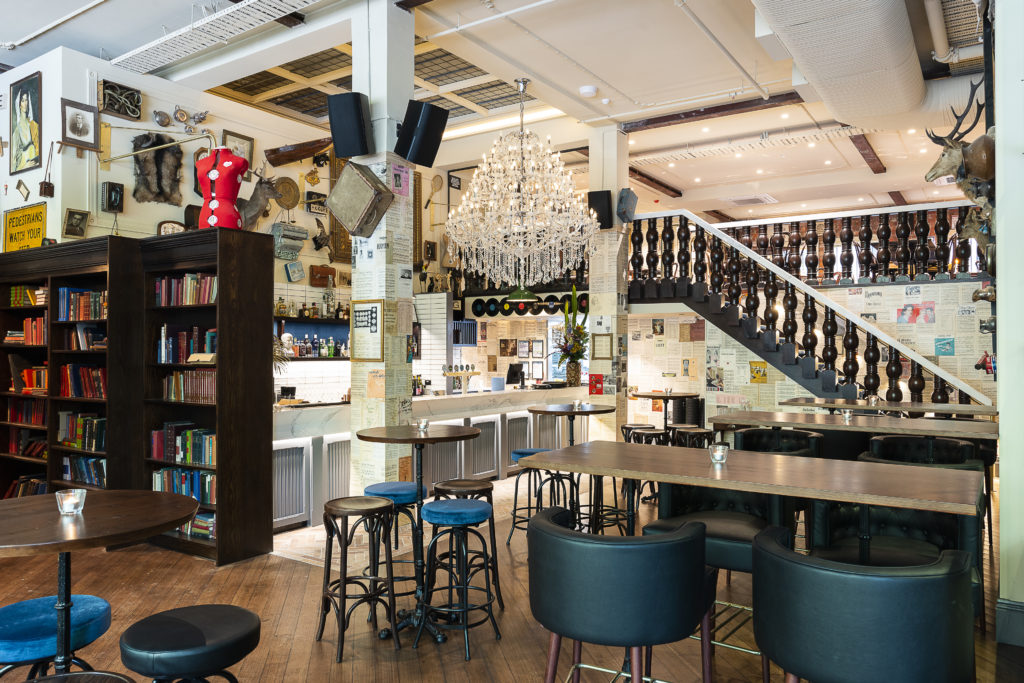 “I’ve had a great team above me at every venue I’ve worked at. I would always push hard and ask to learn how to do things, and I was always given those learning opportunities as a result. Over the years, people within the company realised all the abilities I’d picked up and helped shift me into more leadership positions. It’s been a lot of hard work, but I’m supported here, and it’s been worth it. Over the years, people within the company realised all the abilities I’d picked up and helped shift me into more leadership positions. It’s been a lot of hard work, but I’m supported here, and it’s been worth it.”
“I’ve had a great team above me at every venue I’ve worked at. I would always push hard and ask to learn how to do things, and I was always given those learning opportunities as a result. Over the years, people within the company realised all the abilities I’d picked up and helped shift me into more leadership positions. It’s been a lot of hard work, but I’m supported here, and it’s been worth it. Over the years, people within the company realised all the abilities I’d picked up and helped shift me into more leadership positions. It’s been a lot of hard work, but I’m supported here, and it’s been worth it.”
Douglas Halls – Venue Manager, Fargo & Co
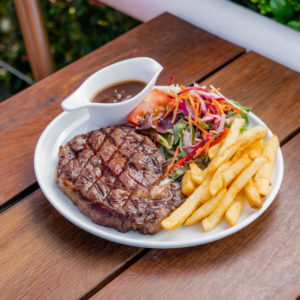 Move to Australia and cook with local ingredients and experience the exciting hospitality scene, while working in some of Australia’s most recognised venues. For more information on visa support, click here: Working Holiday Visa – Australian Venue Co. (ausvenueco.com.au)
Move to Australia and cook with local ingredients and experience the exciting hospitality scene, while working in some of Australia’s most recognised venues. For more information on visa support, click here: Working Holiday Visa – Australian Venue Co. (ausvenueco.com.au)
If you are interested to come and work for The Australian Venue Co. Come and meet Christian and some of the team at the following recruitment roadshows in the UK on the following dates. These are free information sessions:
Register your interest: Click here
- Monday 29th & Tuesday 30th August: LONDON – The Ampersand Hotel, 10 Harrington Road, South Kensington, London SW7 3ER – 10am-3pm
- Wednesday 31st August: BRISTOL – Clayton Hotel Broad Street, Bristol BS1 2EQ – 10am-3pm
- Thursday 1st September: BIRMINGHAM – Clayton Hotel, Albert Street, Birmingham, Birmingham B5 5JE – 10am-3pm
 Friday 2nd September: MANCHESTER – Clayton Hotel, Portland Street, Manchester M1 3HP – 10am-3pm
Friday 2nd September: MANCHESTER – Clayton Hotel, Portland Street, Manchester M1 3HP – 10am-3pm
A Q&A with Tried & Supplied Founder & CEO Domini Hogg – An Easy Way to Source Sustainable & Local Suppliers
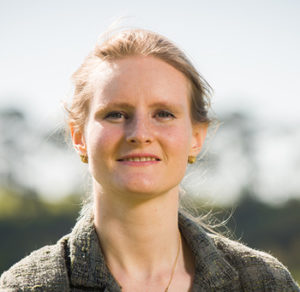 Why did you start Tried & Supplied?
Why did you start Tried & Supplied?
“I wanted to make it both easy and profitable for hospitality businesses to work with local, sustainable suppliers and support the transition to a more positive food system. That means it needs to be easy to find and purchase from local suppliers all in one place, easy to control costs and compliance, and easy to promote the sustainability of the supply chain to attract customers, employees and investors. As an entrepreneur myself I recognised the challenges for many smaller producers of finding the time to market themselves effectively so I created a marketplace where they can be found effortlessly by restaurants in their local area while also clearly displaying how they meet sustainability requirements for procurement teams. Ordering across multiple local suppliers then becomes as simple as one ingredients list, one basket total and a single click of the button.
33% of the Earth’s soils are already degraded and over 90% could become degraded by 2050 according to a recent United Nations report. We can reverse this trend while simultaneously reducing carbon emissions by switching to more regenerative farming practices, but regenerative produce is more diverse by nature and unable to sell into a global food commodity market, which means it is essential to generate demand for it locally in order to encourage farmers to switch. Tried & Supplied provides the digital infrastructure to make this possible.”
What are the benefits of local sourcing?
“When people think about local sourcing, they are often thinking about reducing food miles, but that is only really half the picture. From a chef’s perspective quality local produce means fresher, tastier, more nutritious produce. That can mean you need fewer ingredients to create the same impact on the menu. Ollie Hunter, Chef Owner at The Wheatsheaf Chilton Foliat explained at the Better Hospitality Conference “if I buy better produce, I’ve got more flavour. I do less to it. I need less ingredients to make that flavour taste good.” This has a direct impact on the bottom line while making customers happier.
But local sourcing provides a whole host of other benefits too. The closer relationships you have with suppliers means you can support each other better. They aren’t so far away if you need something urgently and you can get to know what would really help them if you bought, which is often a great way to get a good deal. Being able to tell the local stories of your suppliers also amplifies your marketing efforts and builds you a community of loyal local advocates. You can even arrange farm visits as employee perks to enable your teams to feel more engaged with the menus they are creating and serving. The closer you are to your suppliers, the more transparency, collaboration and loyalty you’ll see.”
How does Tried & Supplied make chefs’ lives easier and more rewarding?
 “Tried & Supplied enables chefs to connect more easily with suppliers and reduce the time they spend on admin during the day. It also facilitates cross team collaboration so that responsibility can be more easily shared rather than concentrated in a few individuals. Each site within a group can curate their own ingredients list from a searchable list of approved suppliers. Orders can then be drafted and added to by any member of the team during the day and approved remotely once they’re ready. If you need to check anything with suppliers, you can contact them through a shared messaging function that keeps all team members informed. By the time you reach the end of the day and want to go home, your supplier orders will be a just a few clicks of a button away. You can even send them on your way home!
“Tried & Supplied enables chefs to connect more easily with suppliers and reduce the time they spend on admin during the day. It also facilitates cross team collaboration so that responsibility can be more easily shared rather than concentrated in a few individuals. Each site within a group can curate their own ingredients list from a searchable list of approved suppliers. Orders can then be drafted and added to by any member of the team during the day and approved remotely once they’re ready. If you need to check anything with suppliers, you can contact them through a shared messaging function that keeps all team members informed. By the time you reach the end of the day and want to go home, your supplier orders will be a just a few clicks of a button away. You can even send them on your way home!
The structure of Tried & Supplied means that chefs can more easily work with the suppliers they want to work with and source the best local produce, while procurement teams and business owners still have the ability to control costs and compliance without going through a laborious paper-based process.”
 What are your top tips for optimising your supply chain?
What are your top tips for optimising your supply chain?
“Start thinking of your supply chain as a profit driver rather than a cost centre. How can you get it to work harder for you as a business? It is a core part of your product after all. Can you use your supplier stories to fuel your marketing? Can your suppliers even offer gastro-experiences to your customers? Can you find local favourites and specialist local ingredients to delight your customers? How can you better support your suppliers so that they offer you the best deals? How do you achieve the best balance between quality, value and consolidation? Is your pound going to be valued more by a smaller local producer or by a large national business? If you’re prompt at paying suppliers, they will be more motivated to support your business in return.”
 What does it look like for chefs getting started on Tried & Supplied?
What does it look like for chefs getting started on Tried & Supplied?
“All we need to know is which suppliers you’d like to work with or whether you’d like us to find new ones for you, so that we can get you set up with their products and prices. We’ll do any data entry involved so you don’t have to worry about that. This doesn’t normally take more than a couple of weeks.”
What kinds of businesses do you typically work with?
“We work with a wide range of businesses from gastropub groups that want to have regional supply chains in each area, to independent restaurants and boutique hotels that want to make purchasing simple and benefit from being part of a procurement network, even street food market operators that want to control the supply chain from a sustainability and delivery consolidation perspective.”
 How do you see the sector changing in the next decade and how is Tried & Supplied positioned to help businesses stay ahead of the curve?
How do you see the sector changing in the next decade and how is Tried & Supplied positioned to help businesses stay ahead of the curve?
“The sector is becoming heavily data orientated in a way that it never was before. This is being driven by regulations such as Natasha’s Law, calories on the menu and the Green Claims Code, as well as consumer demand for information on what they’re eating, and the uptake of technology in hospitality during the pandemic. What we don’t want is for this to detract from the enjoyment of being in the kitchen with the food creating wonderful meals. Tried & Supplied is already addressing this data challenge and providing a means of seamlessly transferring data from supplier right through to menu without the need for additional data entry en route.”
The Chefs’ Forum – We Know Chefs Inside Out
A recent poll conducted by respected industry marketing company Jellybean revealed a fact that we have known for some time: chefs love us. Seriously, they do.
Jellybean polled 300 chefs to find out which were the most influential chef associations. The Chefs’ Forum came second behind culinary giant The British Culinary Federation. We were delighted with that but not surprised.
Bragging that chefs love us is, of course, trumpet blowing but there comes a time when it’s important for clients and prospective clients to really understand what we do well. We are now in our tenth year and both the business and the industry have moved in different directions since the beginning back in 2012.
The Chefs’ Forum is well known for working with catering colleges and chef students and has been instrumental in bringing in industry-leading chefs to teach through the Chefs’ Forum Academies – there are now eight throughout England and Wales, with more on the cards.
However, that’s not all that we do. Did you know that we work with foreign governments now? This year has seen us work with the Japanese and Brazilian governments on projects that required us to leverage our huge chef network to provide market insight.
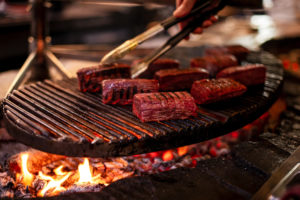 We also worked with newly-launched Redefine Meat (Israel) to showcase the meat alternative to our network. Indeed, Redefine picked us out especially for our ability to put on events that our chefs both enjoy and look forward to.
We also worked with newly-launched Redefine Meat (Israel) to showcase the meat alternative to our network. Indeed, Redefine picked us out especially for our ability to put on events that our chefs both enjoy and look forward to.
We’ve done market insight work for some of the biggest brands in the business such as Rational, Adande, Wild Alaska Seafood and Mitchell & Cooper. We’re currently working with Wedgwood, Chef Works, Koppert Cress and Taylor UK.
High profile catering shows and food events are also asking us to be their media partners, namely the Hotel Restaurant and Catering Show (HRC), The Game Fair and The Commercial Kitchen Show – They are using our platform to reach out to chefs and act as a feature or attraction and drive attendance to their events.
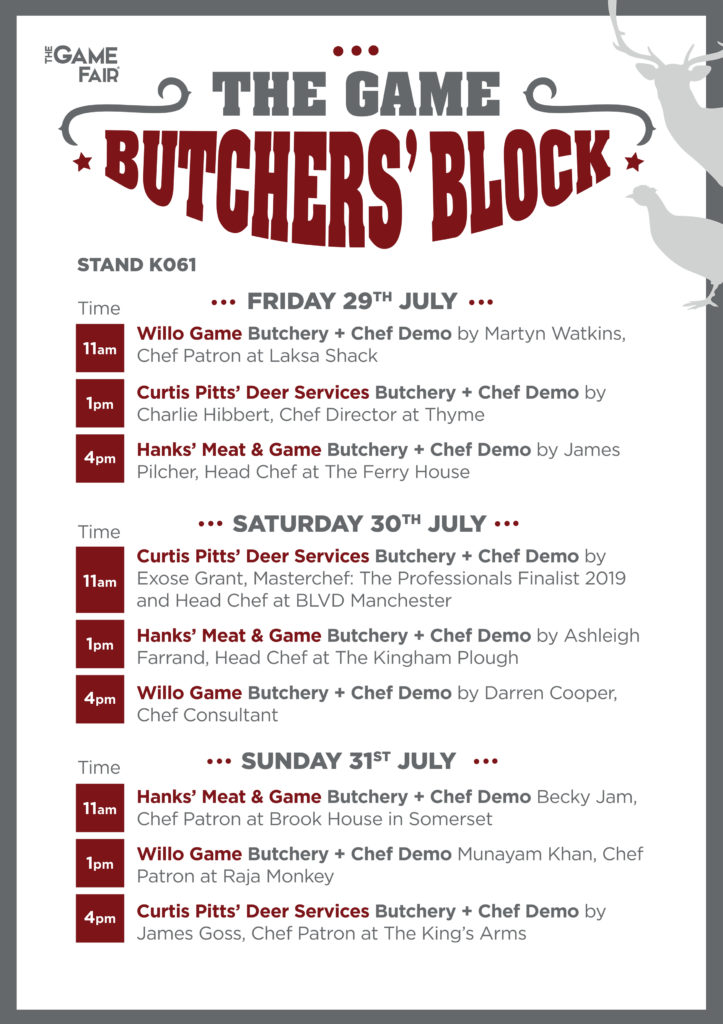 We’re looking forward to being the main butchery feature at The Game Fair (Ragley Hall) at the end of the month and organising the chef demo stage at Casa Brasil this August and September for two weeks of compelling chef demos celebrating Brazilian fresh produce and ingredients.
We’re looking forward to being the main butchery feature at The Game Fair (Ragley Hall) at the end of the month and organising the chef demo stage at Casa Brasil this August and September for two weeks of compelling chef demos celebrating Brazilian fresh produce and ingredients.
You’d think that was enough, but we’ve begun to reach further back in the educational system to start working with schools to help our college partners with taster days to attract the next generation of chefs.
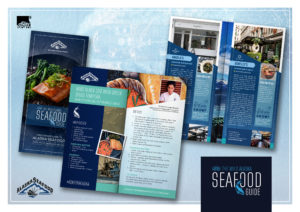 And that’s before we talk about our new content division led by our experienced editor Chandos Elletson. In our first year we produced The Great Game Guide, The Wild Alaska Seafood Guide and The Welsh Game Guide. We’re about to launch our biggest publication yet which is The Chefs’ Knowledge – a brand new and unique book for college students and junior chefs which contains everything you need to know to be a successful chef plus the top 100 dishes that every chef should know. The recipes have been provided by some of the best names in the chef world plus a foreword by James Martin.
And that’s before we talk about our new content division led by our experienced editor Chandos Elletson. In our first year we produced The Great Game Guide, The Wild Alaska Seafood Guide and The Welsh Game Guide. We’re about to launch our biggest publication yet which is The Chefs’ Knowledge – a brand new and unique book for college students and junior chefs which contains everything you need to know to be a successful chef plus the top 100 dishes that every chef should know. The recipes have been provided by some of the best names in the chef world plus a foreword by James Martin.
So, that’s The Chefs’ Forum. A chefs’ association, a media partner, an event specialist and a small team of passionate people who love hospitality and chefs.
Why a Good Recruitment Consultant Should be Your Best Friend
The summer of 2022 is heating up and changing position has never been more difficult. There is a shortage of chefs and businesses up and down the country are doing their best to tempt staff away from where they work to start somewhere new. Salaries are increasing along with uncertainty. It’s a game of snakes and ladders and one false move can set you back with younger chefs able to command higher wages for their services and an option to move quickly up the ladder. But there is also a danger in moving to soon and this is why a good recruitment agent can be your best friend. Their advice can, literally, change your career path. Why? Because they know the industry, understand your value and can match your skills to the best position.
We teamed up with top Southwest recruitment company TTW to find out more and discovered that there’s more to working with a recruitment consultant than meets the eye. Founder Sally Wigg explained:

Sally Wigg, TTW Recruitment
“At TTW we really concentrate on getting to know both our applicants and the businesses we work with. This means that in many cases we have been working together for many years and we understand exactly what they are looking for and the sort of candidates that will fit in.
“We understand that it’s important to find a consultant and recruitment agency that specialise in your sector and really understands your local market. If you are a chef and thinking about a consultant, then recommendations from your peers are always good for this as they have prior experience.
“We’d also advise that honesty pays. Be clear about your aspirations, experience and any barriers that you may have – these can usually be overcome but are better out in the open. Another piece of advice is: allocate time to really get to know your consultant. Go and meet them or organise a time to chat digitally. Do this at a time when you are not at work and can talk freely.
“Lastly, always get in touch if you can’t attend an interview or need to reschedule and be up front with your consultant about other jobs you are looking at and interviews that you are attending so they can manage timescales and obtain the best outcomes for you. These tips will really help you in your job search and give your consultant a chance to get to know you.”

Charlotte Wade, TTW Recruitment
What a good Recruitment Consultant can do for you:
- Give you an up-to-date overview of the chef job market in your region
- Talk to you about realistic salaries and what level you should pitch your applications.
- Help you put together your cv, including a punchy profile
- Put you forward for relevant jobs giving you a full and honest overview of the role and job description.
- Approach perspective employers on your behalf that you are interested in working for.
- Sell you into an employer, talking them through your skills and what you can bring to the role. They can cover any areas of development or gaps in your cv in a positive way.
- Support you with interview preparation, including mock interviews if this would be helpful.
- Feedback to the employer and you during the interview process and negotiate salaries and benefits to get you the best package for the role.
- Help you obtain references from previous employers or educational establishments that can be passed onto new employers.
- A good consultant will keep in touch with you when you start your new job and iron out any problems in the early stages
- Once you find a consultant you trust you will build a relationship that will continue throughout your career, helping you progress and perhaps becoming a client when you yourself are looking to recruit chefs!
Here’s what some of TTW’s candidates have to say about their experience:
“TTW really helped me – with so may jobs around, I didn’t want to attend lots of interviews and trials. Craig understood what I was after and pinpointed me in the right direction, really happy with my new job, it is the step up I was after.” – Matt, Junior Sous Chef, Plymouth

Craig Taylor, TTW Recruitment
“I wanted to moved on from my job, which I had been in for about 2 years, but I needed a new job to fit with my family life, which was proving difficult. I saw TTW’s advert, got talking to Craig and it was a smooth process, which Craig helped me through – thank you very much.” – James, Head Chef, Gloucestershire
“When I relocated to Bristol I needed some advice on the best places to work that would suit my experience. I was recommended Craig at TTW. They suggested two or three places and arranged my interviews on my day off so, it was pretty easy. I moved to Bristol about a month ago and loving it!” – Blake, Chef de Partie, Bristol.
“I’ve always been really picky about where I work, Craig put me in touch with a really good employer who shared the same ethos as me. It was really nice to meet people who are on the same page as me. I received some sound advice from Craig when it came to my salary expectations. I’m glad I took this job and Craig’s now helping me find a new Chef de Partie for my brigade.” – Harry, Head Chef, Somerset
 TTW can help you find your next position or candidate.
TTW can help you find your next position or candidate.
Contact:
Craig Taylor | Chef & Kitchen Management
01934 707 900
07931785564 craig@ttw-recruit.co.uk
ttwrecruit.co.uk
An Interview with Katie Tyler, Event Director at Commercial Kitchen
Briefly introduce yourself and your role within the Commercial Kitchen show
My name is Katie Tyler. I’m the Event Director for Commercial Kitchen, the essential trade show for kitchen innovations. My role is very varied from selling and managing the exhibition stands to organising the keynote programme. I also work with several associations who support the show including the Craft Guild of Chefs and The Master Chefs of Great Britain. Day to day I work alongside the amazing operations and marketing teams, making sure the show looks and feels great for all our exhibitors, visitors and supporters.
Tell us about the Commercial Kitchen show? Location, history etc.
Commercial Kitchen was launched in 2016 at the industry request for a dedicated trade show for kitchen equipment, design, and services. We originally launched at the NEC in Birmingham but after feedback from our supporters we relocated the show to London. As the home to thousands of professional kitchens, this enabled us to further grow and enhance our offering.
Commercial Kitchen made its London debut last year running alongside our sister shows, lunch! and Casual Dining. It has now become the essential show for chefs to discover new innovation for their professional kitchens.
With over 600 exhibitors across the 3 events, chefs and buyers have access to even more innovative suppliers and new products. Whilst buyers can access all three shows via their registration, each event remains distinct. Commercial Kitchen will still very much maintain its own identity with its own show entrance and key features as in past years.
Anticipation is huge for the show, what are you looking forward to most?
I’m really looking forward to getting the hospitality and foodservice industry together for two important days of networking, product launches and free live seminars.
Who is going to be there?
Commercial Kitchen is a focused trade show for senior chefs and decision makers. We already have leading executive chefs and chef patrons registered to attend from across fine dining, casual dining, food-to-go, retail and public sector.
These include key buyers from D&D London, Darwin & Wallace, Greene King, Hilton Group, Las Iguanas, Muse by Tom Aikens, Pan Pacific London, The Ned, Wahaca and Wagamama. All joining us on 14-15 September at ExCeL London.
What’s new for this year?
This year we have added a second Keynote Theatre for even more insightful and educational content. And for the first time at Commercial Kitchen there will be a fantastic all female chef panel taking place on day one. A discussion not to be missed.
What are the particular highlights?
There’s too many to talk about them all. However, one key highlight is our opening interview on Wednesday 14 September with Michelin-starred Chef Tom Aikens talking about his experience in the kitchen and plans for the future.
Are there any themes or relevant issues being addressed for hospitality?
Sustainability is very current within our seminar programme. The Master Chefs of Great Britain will be discussing how hospitality has embraced lower carbon emissions.
How have you found the appetite for live events and has this changed over the past couple of years?
We were overwhelmed with the support of Commercial Kitchen last year; it was a huge celebration after not being able to run the show for two years. We had support from top chefs such as Atul Kochhar, Sat Bains and Cyrus Todiwala. This year will be even bigger and better. I truly believe that nothing beats the physical networking and face to face interaction.
Here are just some of the amazing testimonials we received from leading chefs:
“COMMERCIAL KITCHEN is a really important show for the industry. A definite must-see for innovation.”
ATUL KOCHHAR, CHEF PATRON, ATUL KOCHHAR RESTAURANTS
“An incredible show to find the best kitchen innovations. A must visit!”
SAT BAINS, CHEF PATRON, RESTAURANT SAT BAINS WITH ROOMS
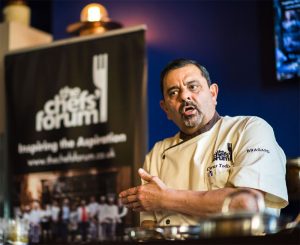 “Attending COMMERCIAL KITCHEN is extremely important to discover industry innovations. It ensures my kitchen is more sustainable and helps me improve the way I run my kitchen.”
“Attending COMMERCIAL KITCHEN is extremely important to discover industry innovations. It ensures my kitchen is more sustainable and helps me improve the way I run my kitchen.”
CYRUS TODIWALA OBE DL, CHEF PATRON, CAFÉ SPICE NAMASTÉ
Commercial Kitchen will return to ExCeL London on 14-15 September 2022. Your ticket will allow you free access to Commercial Kitchen and sister shows lunch! and Casual Dining. To register for a free trade ticket, please visit www.commercialkitchenshow.co.uk and quote VCK25 to save the £20 door fee.
Please note: Commercial Kitchen and sister shows lunch! and Casual Dining are strictly trade only events.
For more information visit www.commercialkitchenshow.co.uk
The Kitchen Aid That’s More Than Essential
Jason Atherton is the definition of a successful modern chef. His restaurant group is recognised all over the world with openings in Asia, the Middle East and the USA. So, when he publicly praises the one piece of kit that really makes his operation sing it’s worth taking notice.
Unsurprisingly, that piece of kit is the new KitchenAid 6.9l professional bowl-lift stand mixer. According to Atherton it’s used every day by his pastry chefs at flagship Pollen Street Social and is amongst the best equipment in the kitchen.
A recent Instagram post showed the machine in use to make the signature Japanese Citrus Parfait with yoghurt sorbet and citrus sauce.
View this post on Instagram
Atherton enthused: “It’s essential and I highly recommend it.”
So, what’s so special about the 6.9l? According to distributor Mitchell & Cooper the 6.9l Kitchen Aid is the top of its class: Robust and durable, quiet and with a smooth rounded finish. It’s easy to clean and the original planetary action provides fast, thorough, mixing.
For more information visit the Mitchell & Cooper website: HERE

